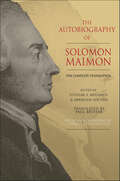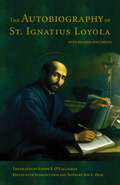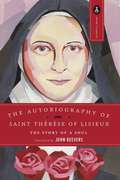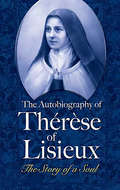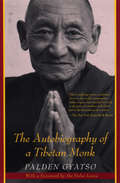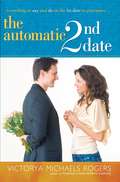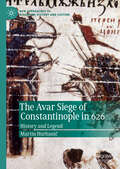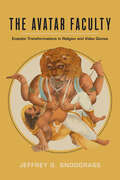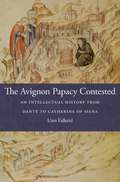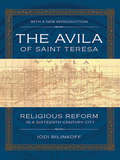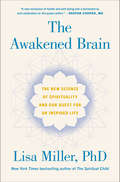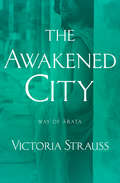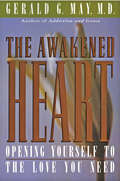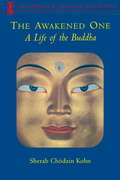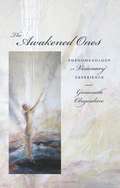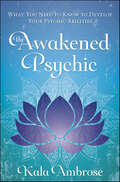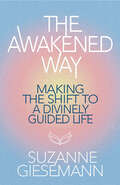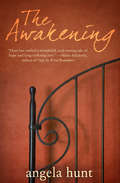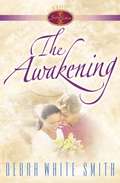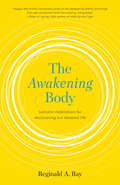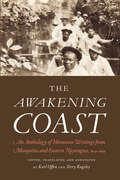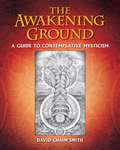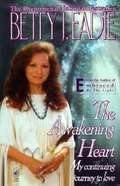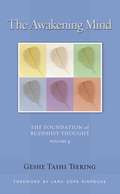- Table View
- List View
The Autobiography of Solomon Maimon: The Complete Translation
by Solomon MaimonThe first complete and annotated English translation of Maimon’s influential and delightfully entertaining memoirSolomon Maimon's autobiography has delighted readers for more than two hundred years, from Goethe, Schiller, and George Eliot to Walter Benjamin and Hannah Arendt. The American poet and critic Adam Kirsch has named it one of the most crucial Jewish books of modern times. Here is the first complete and annotated English edition of this enduring and lively work.Born into a down-on-its-luck provincial Jewish family in 1753, Maimon quickly distinguished himself as a prodigy in learning. Even as a young child, he chafed at the constraints of his Talmudic education and rabbinical training. He recounts how he sought stimulation in the Hasidic community and among students of the Kabbalah--and offers rare and often wickedly funny accounts of both. After a series of picaresque misadventures, Maimon reached Berlin, where he became part of the city's famed Jewish Enlightenment and achieved the philosophical education he so desperately wanted, winning acclaim for being the "sharpest" of Kant's critics, as Kant himself described him.This new edition restores text cut from the abridged 1888 translation by J. Clark Murray, which has long been the only available English edition. Paul Reitter's translation is brilliantly sensitive to the subtleties of Maimon's prose while providing a fluid rendering that contemporary readers will enjoy, and is accompanied by an introduction and notes by Yitzhak Melamed and Abraham Socher that give invaluable insights into Maimon and his extraordinary life. The book also features an afterword by Gideon Freudenthal that provides an authoritative overview of Maimon's contribution to modern philosophy.
The Autobiography of St. Ignatius Loyola
by John C. OlinAvailable in a new digital edition with reflowable text suitable for e-readersFrom the Introduction: “The autobiography...does not cover the complete life of Ignatius. It begins abruptly in 1521 at the great turning point in the saint’s life – his injury in the battle of Pamplona when the French occupied that town and attacked its citadel. It then spans the next seventeen years up to the arrival of Ignatius and his early companions in Rome…These years are the central years of Ignatius’s life. They are the years…that open with his religious conversion and that witness his spiritual growth. They are the years of pilgrimage, to use his own designation, of active travel and searching, and of interior progress in the Christian life. They are the years of preparation for the establishment of the great religious order he will found and for its dynamic thrust in the turbulent Europe and the expanding world of his day.”
The Autobiography of St. Therese Of Lisieux: the Story Of A soul
by St. Therese of Lisieux John BeeversSt. Therese presents her doctrine "the little way of spiritual childhood," and it is based on complete and unshakeable confidence in God's love for us. This confidence means that we cannot be afraid of God even though we sin, for we know that, being human, sin we shall but, provided that after each fall, we stumble to our feet again and continue our advance to God, He will instantly forgive us and come to meet us. St. Therese does not minimise the gravity of sin, but she insists that we must not be crushed by it." This autobiography is a letter written to three people. To Sister Pauline, she recounts her childhood: the suffering caused by the loss of her mother, her frustrations at school, her trip to see the Pope, her entry into the convent, and how she felt and developed during those approximately twenty years. She then writes of her spiritual insights to the Prioress, and finally a chapter to her Sister Marie in which she reveals her innermost intimacies with Jesus. Written during the last two and a half years of her life, Therese shows us how she managed full-time work and full-time illness. Her writing is simple, clear and beautiful. This translation more accurately reflects Therese's own writing than her book as edited by Mother Agnes (also available from Bookshare).
The Autobiography of Thérèse of Lisieux: The Story of a Soul
by Thérèse Of Lisieux"Our Lord does not look so much at the greatness of our actions, nor even at their difficulty, but at the love with which we do them." -- Saint Thérèse of LisieuxOne of the greatest spiritual classics ever written, this influential autobiography has been translated into nearly every language, capturing hearts and minds around the world. Simply written in clear, enchanting prose, this memoir reveals the path to true inner peace, for "Our Lord needs from us neither great deeds nor profound thoughts. Neither intelligence nor talents. He cherishes simplicity."Born in France, young Thérèse Martin (1873-1897) entered the Carmel Convent of Lisieux at the age of fifteen. Also known as "the Little Flower," her autobiography, written at the request of her Carmelite Superiors in the last years of her life, includes poignant girlhood recollections and her teachings of "the little way of childhood." The "little way," inspired by the Gospel, places love at the very center of every action we take. Traditional yet unique, delicate yet heroic, Thérèse taught a shining spirituality that could easily be adapted into everyday life. Her divine words of acceptance and love are universal, and have gently led many people -- both within the Catholic Church and outside of Christianity -- back to their faith.Saint Thérèse was canonized by Pope Pius XI in 1925. In 1997, she was proclaimed a Doctor of the Church by Pope John Paul II.
The Autobiography of a Tibetan Monk
by The Dalai Lama Palden GyatsoPalden Gyatso was born in a Tibetan village in 1933 and became an ordained Buddhist monk at 18 - just as Tibet was in the midst of political upheaval. When Communist China invaded Tibet in 1950, it embarked on a program of "reform” that would eventually affect all of Tibet’s citizens and nearly decimate its ancient culture. In 1967, the Chinese destroyed monasteries across Tibet and forced thousands of monks into labor camps and prisons. Gyatso spent the next 25 years of his life enduring interrogation and torture simply for the strength of his beliefs. Palden Gyatso’s story bears witness to the resilience of the human spirit, and to the strength of Tibet’s proud civilization, faced with cultural genocide.
The Automatic 2nd Date
by Victorya Michaels RogersFor women who long for serious commitment in a relationship, the harsh reality is that if they can't get a man to call them back for a second date, they will be doomed to a life of single-date relationships with no "till death do us part." Dating expert, Victorya Michaels Rogers, author of Finding a Man Worth Keeping, tells how in this book she went from no dates to being pursued by an Academy Award winner, a rock star, a gospel singer, a preacher, an athlete, and more--until she found the man she decided was worth keeping. Rogers has dating down to a science, and shares her expertise in sure-fire, guaranteed-to-work secrets. And the best part is that these secrets work for any single woman at any age--secrets that will teach readers how to: Evaluate her own personal plusses and minuses and learn how to enhance her finest qualities while minimizing negatives. Find eligible men, even involving friends and family in her search Flirt just enough to get him to come over and ask her out Charm her way through her first phone call Dress for the first date Establish rapport and relax in the first fifteen minutes of her first date Keep the first-date conversation all about him so she can (1) see if he matches her "wish list" and (2) keep him interested in his favorite subject--himself. Use body language, gestures, and vocal tone to communicate just what she wants him to know Flatter a man with believable, genuine compliments Know how far to go on the first date Let him down easy if there's no "spark" Not to scare him off by being too pushy Rogers has discovered the secrets to finding and keeping the man of your dreams and has proven that her methods work. She went on dates with more than one hundred men in eighteen months, 98 percent of whom asked her out for a second date. Written for women, by a woman who practiced what she preaches, this book is guaranteed to teach women how to transform their repeat-date ratio.
The Avar Siege of Constantinople in 626: History and Legend (New Approaches to Byzantine History and Culture)
by Martin HurbaničThis book examines the Avar siege of Constantinople in 626, one of the most significant events of the seventh century, and the impact and repercussions this had on the political, military, economic and religious structures of the Byzantine Empire. The siege put an end to the power politics and hegemony of the Avars in South East Europe and was the first attempt to destroy Constantinople, the capital of the Eastern Roman Empire. Besides the far-reaching military factors, the siege had deeper ideological effects on the mentality of the inhabitants of the Empire, and it helped establish Constantinople as the spiritual centre of eastern Christianity protected by God and his Mother. Martin Hurbanič discusses, from a chronological and thematic perspective, the process through which the historical siege was transformed into a timeless myth, and examines the various aspects which make the event a unique historical moment in the history of mankind – a moment in which the modern story overlaps with the legend with far-reaching effects, not only in the Byzantine Empire but also in other European countries.
The Avatar Faculty: Ecstatic Transformations in Religion and Video Games (Ethnographic Studies in Subjectivity #16)
by Jeffrey G. SnodgrassThe Avatar Faculty creatively examines the parallels between spiritual and digital activities to explore the roles that symbolic second selves—avatars—can play in our lives. The use of avatars can allow for what anthropologists call ecstasy, from the Greek ekstasis, meaning "standing outside oneself." The archaic techniques of promoting spiritual ecstasy, which remain central to religious healing traditions around the world, now also have contemporary analogues in virtual worlds found on the internet. In this innovative book, Jeffrey G. Snodgrass argues that avatars allow for the ecstatic projection of consciousness into alternate realities, potentially providing both the spiritually possessed and gamers access to superior secondary identities with elevated social standing. Even if only temporary, self-transformations of these kinds can help reduce psychosocial stress and positively improve health and well-being.
The Avignon Papacy Contested: An Intellectual History from Dante to Catherine of Siena (I Tatti studies in Italian Renaissance history #21)
by Unn FalkeidUnn Falkeid considers the work of six fourteenth-century writers who waged literary war against the Avignon papacy’s increasing claims of supremacy over secular rulers—a conflict that engaged contemporary critics from every corner of Europe. She illuminates arguments put forth by Dante, Petrarch, William of Ockham, Catherine of Siena, and others.
The Avila of Saint Teresa: Religious Reform in a Sixteenth-Century City
by Jodi BilinkoffThe Avila of Saint Teresa provides both a fascinating account of social and religious change in one important Castilian city and a historical analysis of the life and work of the religious mystic Saint Teresa of Jesus. Jodi Bilinkoff's rich socioeconomic history of sixteenth-century Avila illuminates the conditions that helped to shape the religious reforms for which the city's most famous citizen is celebrated. Bilinkoff takes as her subject the period during which Avila became a center of intense religious activity and the home of a number of influential mystics and religious reformers. During this time, she notes, urban expansion and increased economic opportunity fostered the social and political aspirations of a new "middle class" of merchants, professionals, and minor clerics. This group supported the creation of religious institutions that fostered such values as individual spiritual revitalization, religious poverty, and apostolic service to the urban community. According to Bilinkoff, these reform movements provided an alternative to the traditional, dynastic style of spirituality expressed by the ruling elite, and profoundly influenced Saint Teresa in her renewal of Carmelite monastic life. A focal point of the book is the controversy surrounding Teresa's foundation of a new convent in August 1562. Seeking to discover why people in Avila strenuously opposed this ostensibly innocent act and to reveal what distinguished Teresa's convent from the many others in the city, Bilinkoff offers a detailed examination of the social meaning of religious institutions in Avila. Historians of early modern Europe, especially those concerned with the history of religious culture, urban history, and women's history, specialists in religious studies, and other readers interested in the life of Saint Teresa or in the history of Catholicism will welcome The Avila of Saint Teresa. First published by Cornell University Press in 1989, this new edition of The Avila of Saint Teresa includes a new introduction by the author.
The Awakened Brain: The New Science of Spirituality and Our Quest for an Inspired Life
by Lisa MillerA groundbreaking exploration of the neuroscience of spirituality and a bold new paradigm for health, healing, and resilience—from a New York Times bestselling author and award-winning researcher &“A new revolution of health and well-being and a testament to, and celebration of, the power within.&”—Deepak Chopra, MDWhether it&’s meditation or a walk in nature, reading a sacred text or saying a prayer, there are many ways to tap into a heightened awareness of the world around you and your place in it. In The Awakened Brain, psychologist Dr. Lisa Miller shows you how. Weaving her own deeply personal journey of awakening with her groundbreaking research, Dr. Miller&’s book reveals that humans are universally equipped with a capacity for spirituality, and that our brains become more resilient and robust as a result of it. For leaders in business and government, truth-seekers, parents, healers, educators, and any person confronting life&’s biggest questions, The Awakened Brain combines cutting-edge science (from MRI studies to genetic research, epidemiology, and more) with on-the-ground application for people of all ages and from all walks of life, illuminating the surprising science of spirituality and how to engage it in our lives: • The awakened decision is the better decision. With an awakened perception, we are more creative, collaborative, ethical, and innovative. • The awakened brain is the healthier brain. An engaged spiritual life enhances grit, optimism, and resilience while providing insulation against addiction, trauma, and depression. • The awakened life is the inspired life. Loss, uncertainty, and even trauma are the gateways by which we are invited to move beyond merely coping with hardship to transcend into a life of renewal, healing, joy, and fulfillment. Absorbing, uplifting, and ultimately enlightening, The Awakened Brain is a conversation-starting saga of scientific discovery packed with counterintuitive findings and practical advice on concrete ways to access your innate spirituality and build a life of meaning and contribution.
The Awakened City (Way of Ârata #2)
by Victoria StraussIn the remarkable sequel to The Burning Land, a man of peace is forced to confront his unwanted destiny in a fantasy realm torn apart by magic, religious intolerance, and holy war For years they were oppressed, outlawed, and hunted. But the Brethren have finally prevailed, and now the kingdom of Arsace is theirs once more. Unbending in their single-minded devotion to the slumbering god Ârata, the Brethren will not allow their religious authority to be questioned. Therefore, all of the remaining heretical renegade mages known as Shapers must be eliminated, their magic rendered impotent, and Refuge, their hidden desert sanctuary, destroyed. Of all the Shapers who survived an earlier attack on Refuge, the one known as Râvar possesses the greatest power, and he has declared himself the Next Messenger who will usher in a new, illuminated age. But the false prophet&’s decision to take Axane the Dreamer as his captive could have unforeseen, world-shattering consequences, for it has drawn the seer&’s devoted husband, Gyalo Amdo Samchen, away from his chosen path of peace. To rescue his endangered beloved, the former priest will have to confront his greatest fear, for in the terrible flames of holy war the true Next Messenger will be revealed.The Awakened City is the powerful sequel to Victoria Strauss&’s acclaimed fantasy masterwork The Burning Land. A story of faith, fate, love, and magic that unfolds in a richly imagined world plagued by violence, intolerance, and religious persecution, this is a stunning and intelligent work of literary artistry from a uniquely talented fantasist.
The Awakened Heart: Opening Yourself To The Love You Need
by Gerald G. May"Integrating the wisdom of ancient mystics and the insights of contemporary thinkers, May examines the spiritual longings that are often hidden and controlled by society's pressures and expectations."-Publishers Weekly
The Awakened One
by Sherab Chodzin KohnThe story of the founder of Buddhism is one of the world's great archetypal tales of spiritual awakening. He was born Siddhartha Gautama in the sixth century BCE, the son of a prince who ruled a small kingdom in what is now Nepal. Siddhartha led a sheltered existence until the age of twenty-nine, when he left his life of ease and set out to find a solution to the problem of suffering. For years he wandered as a homeless ascetic, practicing severe austerities that brought him to the brink of death but no nearer to his goal. He then abandoned asceticism for a "middle way." Sitting down under a tree, he vowed to remain there until he realized the truth. After a night of deep meditation, his Enlightenment came at dawn, and he was thereafter known as the Buddha, the "Awakened One."
The Awakened Ones: Phenomenology of Visionary Experience
by Gananath ObeyesekereWhile a rational consciousness grasps many truths, Gananath Obeyesekere believes an even richer knowledge is possible through a bold confrontation with the stuff of visions and dreams. Spanning both Buddhist and European forms of visionary experience, he fearlessly pursues the symbolic, nonrational depths of such phenomena, reawakening the intuitive, creative impulses that power greater understanding. Throughout his career, Obeyesekere has combined psychoanalysis and anthropology to illuminate the relationship between personal symbolism and religious experience. In this book, he begins with Buddha's visionary trances wherein, over the course of four hours, he witnesses hundreds of thousands of his past births and eons of world evolution, renewal, and disappearance. He then connects this fracturing of empirical and visionary time to the realm of space, considering the experience of a female Christian penitent, who stares devotedly at a tiny crucifix only to see the space around it expand to mirror Christ's suffering. Obeyesekere follows the unconscious motivations that underly rapture, the fantastical consumption of Christ's body and blood, and body mutilation and levitation, bridging medieval Catholicism and the movements of early modern thought, reflected in William Blake's artistic visions and poetic dreams. He develops the term "dream-ego" through a discussion of visionary journeys, Jung's and Freud's scientific dreaming, and the cosmic and erotic dream-visions of New Age virtuosos, and he defines the parameters of a visionary mode of knowledge that provides a more elastic understanding of truth. A career-culminating work, this volume not only translates the epistemology of Hindu and Buddhist thinkers to western audiences but also revitalizes western philosophical and scientific inquiry.
The Awakened Ones: Phenomenology of Visionary Experience
by Gananath ObeyesekereWhile a rational consciousness grasps many truths, Gananath Obeyesekere believes an even richer knowledge is possible through a bold confrontation with the stuff of visions and dreams. Spanning both Buddhist and European forms of visionary experience, he fearlessly pursues the symbolic, nonrational depths of such phenomena, reawakening the intuitive, creative impulses that power greater understanding.Throughout his career, Obeyesekere has combined psychoanalysis and anthropology to illuminate the relationship between personal symbolism and religious experience. In this book, he begins with Buddha's visionary trances wherein, over the course of four hours, he witnesses hundreds of thousands of his past births and eons of world evolution, renewal, and disappearance. He then connects this fracturing of empirical and visionary time to the realm of space, considering the experience of a female Christian penitent, who stares devotedly at a tiny crucifix only to see the space around it expand to mirror Christ's suffering. Obeyesekere follows the unconscious motivations underlying rapture, the fantastical consumption of Christ's body and blood, and body mutilation and levitation, bridging medieval Catholicism and the movements of early modern thought as reflected in William Blake's artistic visions and poetic dreams. He develops the term "dream-ego" through a discussion of visionary journeys, Carl Jung's and Sigmund Freud's scientific dreaming, and the cosmic and erotic dream-visions of New Age virtuosos, and he defines the parameters of a visionary mode of knowledge that provides a more elastic understanding of truth. A career-culminating work, this volume translates the epistemology of Hindu and Buddhist thinkers for western audiences while revitalizing western philosophical and scientific inquiry.
The Awakened Psychic: What You Need to Know to Develop Your Psychic Abilities
by Kala AmbroseThe Awakened Psychic is a guide to developing your inner psychic and tuning in to your intuitive wisdom. With hands-on exercises and stories from the author’s practice, this book is all about lifting the veil between the worlds, seeing into the future, and connecting with spirits and loved ones on the other side. Join Kala Ambrose as she explores ideas and techniques for enhancing your psychic abilities and making the most of your intuitive talents, including:How to build a powerful energy field for psychic self-defenseThe difference between being psychic and being a mediumTechniques to heighten your psychic abilitiesHow ghosts and spirits are differentHow to awaken your powerful inner intuitive oracleThe difference between an intuitive hunch and being psychicTechniques to connect with spirit guides and your higher selfEveryone has intuitive ability at some level, and those abilities can be helpful tools in making decisions, following your dreams, enhancing your relationships, and building a business or career that you enjoy. In this book, you'll discover the different kinds of psychic abilities and how they work together so that you can manifest your destiny and live a spiritually fulfilled life.
The Awakened Way: Making the Shift to a Divinely Guided Life
by Suzanne GiesemannThe Awakened Way combines deep spiritual wisdom and practical tools for living a consciously connected and divinely guided life, helping readers go from an emptiness that can&’t be filled to a fullness that can&’t be contained.The Awakened Way is the soul&’s answer to your earthly challenges.This book invites you to live the awakened way, a path that embraces ancient wisdom and integrates it with the latest scientific discoveries about the nature of consciousness and the underlying reality.Many self-help books focus on our human nature. They miss the point that we are both human and a soul. They fail to teach us to shift our focus and access the Source of solutions that is always available and will never steer us wrong.The Awakened Way is a higher-self book that reorients your belief system and shows you how to approach life from the soul's perspective, where the highest answers lie.&“A practical resource for many who are seeking a richer connection with lost loved ones and the spiritual realm in general.&”— Eben Alexander, M.D., former Harvard neurosurgeon and author of Proof of Heaven, The Map of Heaven, and Living in a Mindful Universe
The Awakening
by Angela HuntFrom a Christy Award–winning author: “A wonderful, soul-stirring tale of hope and long-suffering love” (Marlo Schalesky). Aurora Rose is different from her neighbors, different from most people. Still single at thirty-five, she spends every hour of her time in an elegant Manhattan apartment, quietly caring for her invalid mother. Then her mother dies, and Aurora’s world spins on its axis. Reality shatters into startlingly realistic nightmares, and the shards of troubling memories slice into her sleep. Everything Aurora has believed about herself and her world fades into murky dreams. Something, someone is pursuing her—growing more threatening by the day, testing the limits of her sanity. Will she find the courage to confront her unseen pursuer? Or will she surrender to the destructive melancholy that haunts her days and nights? This psychologically suspenseful story about fear, faith, and finding the way through the darkness is a “lovely tale” from the acclaimed author of Egypt’s Sister and Judah’s Wife (Publishers Weekly).
The Awakening (Seven Sisters Series Book #2)
by Debra White SmithViatnamese-American, Super Model, Kim Lan has always wanted to go to her mothers native land. Now that she has the opportunity... will she take it? Will she live through it? Join her as God not only reveals His plan for her life... but as she is truely "changed" into the person He wants her to be.
The Awakening Body: Somatic Meditation for Discovering Our Deepest Life
by Reginald A. RayMany of us experience life through so many conceptual filters that we never recognize the freedom and joy that are inherent in us--and are in fact the essence of who we are. We can grow old not realizing that one of the most powerful tools to escape the painful knots we tie ourselves in is, literally, at our fingertips: our body.Here, Reggie Ray cracks open the shell of the mind-body dichotomy and presents six fundamental body-based practices that connect us back to who we really are. These practices cut through the mental fabrications through which we experience our world and lead us directly to the richness of living a fully present, embodied human life.Includes a link to free downloads of recorded guided practices.
The Awakening Coast: An Anthology of Moravian Writings from Mosquitia and Eastern Nicaragua, 1849-1899
by Terry Rugeley Karl OffenThe indigenous and Creole inhabitants (Mosquitians of African descent) of the Mosquito Reserve in present-day Nicaragua underwent a key transformation when two Moravian missionaries arrived in 1849. Within a few short generations, the new faith became so firmly established there that eastern Nicaragua to this day remains one of the world’s strongest Moravian enclaves. The Awakening Coast offers the first comprehensive English-language selection of the writings of the multinational missionaries who established the Moravian faith among the indigenous and Afro-descendant populations through the turbulent years of the Great Awakening of 1881 to 1882, when converts flocked to the church and the mission’s membership more than doubled. The anthology tracks the intersection of religious, political, and economic forces that led to this dynamic religious shift and illustrates how the mission’s first fifty years turned a relatively obscure branch of Protestantism into the most important political and spiritual institution in the region by contextualizing the Great Awakening, Protestant evangelism, and indigenous identity during this time of dramatic social change.
The Awakening Ground: A Guide to Contemplative Mysticism
by David Chaim SmithAuthor David Chaim Smith offers a guide to the practice of mystical contemplation from the perspective of a highly unusual form of non-dual Kabbalah, unfettered by both religious mythology and psychological reductionism. The path articulates the ultimate quest for meaning, which seeks to pass through the clutter of the mind’s conceptual associations to nakedly and directly recognize the innate essentiality of all things known as the light of En (no) Sof (end), or the Infinite. Most mainstream conventional schools of Kabbalah hold such a radical aspiration to be inapproachable at best, and heretical at worst. • The work introduces six stages that articulate how the mind breaks through its own restrictive habitual reflexes to awaken to the ground of En Sof, which is the mind’s essential nature • Each stage is illustrated by the author’s own original works of art and line diagrams • Draws upon obscure sources such as the 13th-century Kabbalistic text Fountain of Wisdom, various alchemical and gnostic texts, and the writings of Isaac the Blind The author reveals how meaning never remains static--its nature is to move, transmit, and display--yet its precious potential becomes buried under layers of mental constructs. He explains how the mind’s habits and reflexes impose structures of containment that try to make sense out of phenomena, but these very structures actually obscure their essence completely. Smith’s experiential path to gnostic awakening reveals how, in the wake of the lesser concerns of the conceptual mind, primordial purity shines in resonances of vast poetic beauty, if a sensibility of wonder, awe, and delight is cultivated. Offering a step-by-step analysis to the ecstatic aspects of contemplative revelation, David Chaim Smith explores how to ride the razor’s edge of the paradox to coax the mind from the sleep of habituation towards the culmination of gnosis. Although the process is described within the traditional symbol system of kabbalah, its import is a truly radical exponent of extreme mysticism.
The Awakening Heart: My Continuing Journey to Love
by Betty J. EadieAddressing daily concerns, Betty J. Eadie gives readers the keys to an elemental, healing life force. She examines the course of her life source, and reveals the profound power that unites us all.
The Awakening Mind
by Lama Thubten Zopa Rinpoche Geshe Tashi Tsering Gordon McdougallBodhichitta, often translated as "great compassion," is the gem at the heart of Buddhism. From this altruistic desire to serve others, all other Buddhist practices naturally flow, therefore, this state of mind is one Buddhists should understand and cultivate. In The Awakening Mind, Geshe Tashi Tsering leads us through the two main methods to develop bodhichitta that have been developed by the great Indian and Tibetan Buddhists over the centuries: the seven points of cause and effect, and equalizing and exchanging the self with others. This is the fourth release from Geshe Tashi's Foundation of Buddhist Thought series, which individually and collectively represent an excellent introduction to Tibetan Buddhism. These unique and friendly books are based on the curriculum of a popular course of the same name, developed by Geshe Tashi himself. Geshe Tashi's presentations combine rigor and comprehensiveness with lucidity and accessibility, never divorced from the basic humanity and warmth of his personality. In Geshe Tashi, we encounter the new generation of Tibetan monk-scholars teaching in the West who are following in the footsteps of such revered and groundbreaking teachers as Geshe Wangyal and Geshe Sopa.
